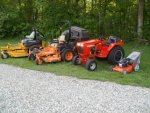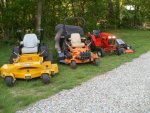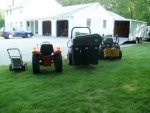There are two ways to look at your problem; one is from a position of what you need, and the other from a viewpoint of what you want.
To determine what you need, look at the total acreage and time available, and get an average acre/hour figure. Then find out a true, reasonable mowing rate for some brands you're interested in. Don't look at brochure mow rates and think you'll hit them all the time as they are often published at "best case" scenarios. This will help get you in the range of size deck you'll need. Then make sure to take into account any physical barriers (trees, shrubs, gates, conveyance limitations, etc) that would preclude a particular size deck. If you're realistic and accurate, you'll end up with a good idea of what it will take to mow in the parameters you've set forth. I generally take the acre/hour rate in the published brochure, and take 80% as a real world figure. Also know that those rates are generally rated at flat open ground and not with lots of hills and obstacles, which will greatly alter any brands productivity rate.
I will note a few items that may be of consequence to you, in no particular order:
1) engine configuration or brand really don't matter much overall. Most of the good brand names do well; Kaw, Kohler, Honda, etc make decent engines. Even Briggs do well in non-commercial applications. And that also means you don't really need a liquid cooled or fuel injected engine. While they are top notch, your use that you describe is not commercial; you're not worried about running 8 hours a day, six days a week for an entire mowing season. Liquid cooling is a bit quieter, but also much more costly in terms of intial purchase and also upkeep of hoses, pump, coolant, time, etc. Air cooling works very well and is much cheaper and easier to maintain. Fuel injection can save money in fuel efficiency, but it has to pay for itself over hundreds upon hundreds of hours of operation. And if it goes bad, it's expensive to fix. For the homeowner, air cooled and carb'd is hard to beat in terms of cost/performance ratio.
2) dealers don't seem to matter as much as one would think. I would use brands only as a vague guide. Even dealers can come and go out of business, or move closer or further with no care whatsoever how it affects you; they will do what is best for their business with no thought of you. So don't hang your hat on falling in love with a dealer; be practical in this manner.
3) brand differentiation may not be nearly as big as you think. When I shopped for my ZTR, I looked at Scag, Deere, Exmark because they were reasonably close and had the sizes I wanted. When I compared the real equipment information, they all used the exact same Kaw motor, and the exact same wheel motors. Of the hyd pumps, both the Scag and Exmark used the exact same twin pumps, where the JD used one larger central pump. In short, they were VERY similar under the paint. Yes - the frames differed slightly and some amenities were different. But I felt as though they were all very comparable because I looked at the shop manuals and parts manuals on-line and found out that under the skin, they essentially used the same equipment to motivate the systems. Even the PTO clutch was the same for all three! What I am saying here is that I agree there are always things a bit different for any given brand, but often they use similar (if not the same) equipment for any given application. There are, after all, only so many brand/types of pumps, motors, etc as vendors out there. Any brand of mower you select, will be stout as long as you are buying a commercial brand. When I was at the Exmark dealer, he tried to convince me that they were superior because they had "better" components. When I pressed him on the issue, and then subsequently showed him the parts manuals, his story quickly melted away. In contrast, the Scag dealer I was at was also a Deere dealer, and he flat out admitted that there was little difference between most major brands for the major components. He ended up with my business simply because he was honest and told me he had more margin to work with by selling the Scag line, and therefore could knock more off the sticker price of a Scag. I chose the Scag because they had the best price of the three at the time.
I use my ZTR in howeowner mowing and not commercial, and I doubt I'll ever wear it out. Sure, some consumable thigns will wear such as belts, bearings, relays, etc. But the general heavy nature of these commercial mowers means they will last a homeowner a lifetime if well cared for.
There are times when "bigger is better". But only in context. A bigger mower that is offered at a discount because it's last year's closeout model may be a good decision. But a bigger mower that has the massive badazz engine and huge deck may end up being more to manage in terms of transport, use and payment. ROI is a matter of matching up a high return for the lowest investment while still meeting the defined performance criteria. Although counter-intuitive to our male egos, things can be too big at times. Mad Mackie has a good point; it's hard to turn down a more robust machine if the terms are good. But my point has equal weight; buying too much, just because you can afford it, is not always the best long term decision.
Or, buy what you want, because some emotional attachment drives you towards sleeping better at night. Perhaps you like red, or don't like orange, or hate green, or whatever ...
My point is that when one takes the time to analyze all the true "needs", and then rank orders them with a sense of practicality, one is rarely disappointed in one's final decision.
However, emotional decisions based upon what one "wants" has often manifested into regret in more than one occasion.
It's up to you.




